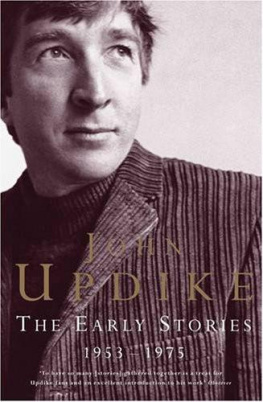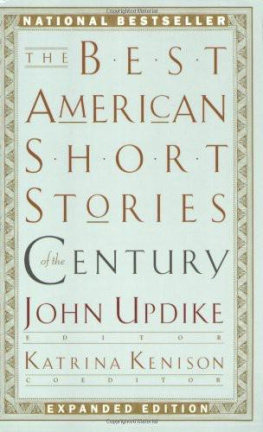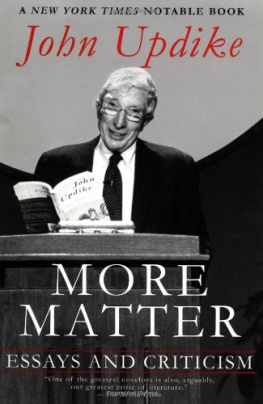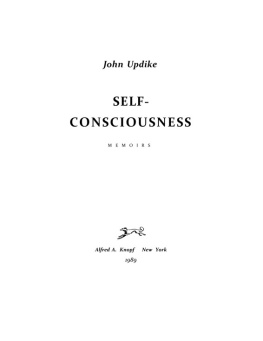Updike - Self-consciousness: memoirs
Here you can read online Updike - Self-consciousness: memoirs full text of the book (entire story) in english for free. Download pdf and epub, get meaning, cover and reviews about this ebook. City: New York, year: 2012, publisher: Random House Publishing Group;Random House Trade Paperbacks, genre: Non-fiction. Description of the work, (preface) as well as reviews are available. Best literature library LitArk.com created for fans of good reading and offers a wide selection of genres:
Romance novel
Science fiction
Adventure
Detective
Science
History
Home and family
Prose
Art
Politics
Computer
Non-fiction
Religion
Business
Children
Humor
Choose a favorite category and find really read worthwhile books. Enjoy immersion in the world of imagination, feel the emotions of the characters or learn something new for yourself, make an fascinating discovery.

- Book:Self-consciousness: memoirs
- Author:
- Publisher:Random House Publishing Group;Random House Trade Paperbacks
- Genre:
- Year:2012
- City:New York
- Rating:3 / 5
- Favourites:Add to favourites
- Your mark:
- 60
- 1
- 2
- 3
- 4
- 5
Self-consciousness: memoirs: summary, description and annotation
We offer to read an annotation, description, summary or preface (depends on what the author of the book "Self-consciousness: memoirs" wrote himself). If you haven't found the necessary information about the book — write in the comments, we will try to find it.
Updike: author's other books
Who wrote Self-consciousness: memoirs? Find out the surname, the name of the author of the book and a list of all author's works by series.
Self-consciousness: memoirs — read online for free the complete book (whole text) full work
Below is the text of the book, divided by pages. System saving the place of the last page read, allows you to conveniently read the book "Self-consciousness: memoirs" online for free, without having to search again every time where you left off. Put a bookmark, and you can go to the page where you finished reading at any time.
Font size:
Interval:
Bookmark:
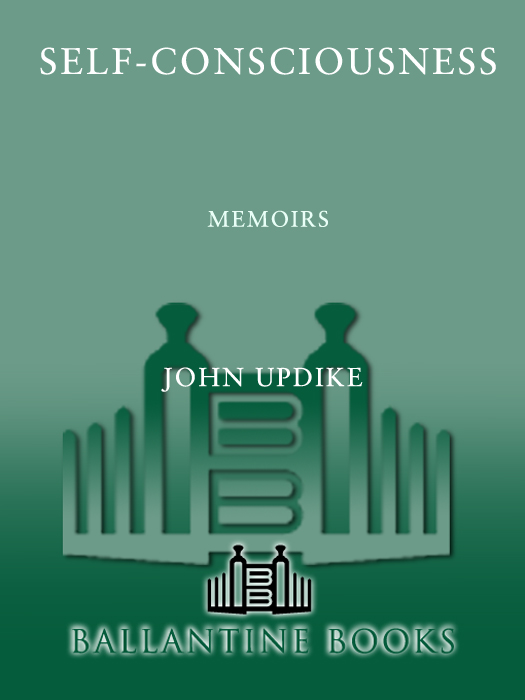
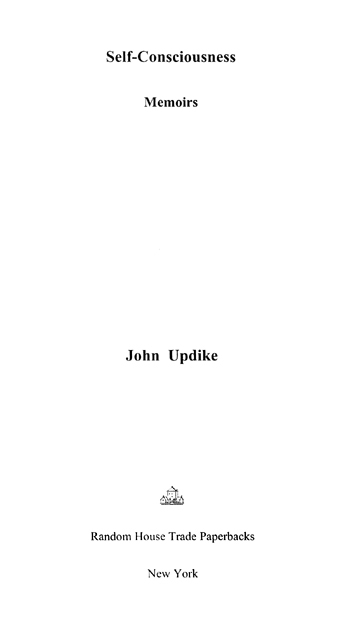
2012 Random House eBook Edition
Copyright 1989 by John Updike
All rights reserved.
Published in the United States by Random House Trade Paperbacks, an imprint of The Random House Publishing Group, a division of Random House, Inc., New York.
R ANDOM H OUSE T RADE P APERBACKS and colophon are trademarks of Random House, Inc.
Originally published in hardcover in the United States by Alfred A. Knopf, in 1989.
A Soft Spring Night in Shillington, At War with My Skin, and a passage from On Being a Self Forever were originally published in The New Yorker. A large part of Getting the Words Out was originally published in Granta, and a small section of Boston Review. Much of On Not Being a Dove made its debut in Commentary.
Grateful acknowledgment is made to the following for permission to reprint previously published material:
Ched Music Corp., Polygram Music Publishing Companies, Shapiro, Bernstein & Co., Inc., and The Welk Music Group: Excerpt from The Old Lamplighter by Charles Tobias and Nat Simon. Copyright 1946 by Shapiro, Bernstein & Co., Inc. Copyright renewed and assigned to Polygram International Publishing Inc. and Ched Music Corp. International copyright secured. All rights reserved. Used by permission.
Marlong Music Corporation and Bourne Company: Excerpt from All of Me, words and music by Seymour Simons and Gerald Marks. Copyright by Marlong Music Corp., New York City; Copyright 1931 by Bourne Co. Copyright renewed. Rights outside the U.S. administered by Bourne Co. International copyright secured. All rights reserved. Used by permission.
Warner/Chappell Music, Inc.: Excerpt from Bidin My Time by George and Ira Gershwin. Copyright 1930 by WB Music Corp. (Renewed). All rights reserved. Used by permission.
eISBN: 978-0-679-64580-1
www.atrandom.com
v3.1_r1
We are persuaded that a thread runs through all things: all worlds are strung on it, as beads: and men, and events, and life, come to us, only because of that thread.
Emerson, Montaigne; or, The Skeptic
I find myself saying briefly and prosaically that it is much more important to be oneself than anything else.
Virginia Woolf, A Room of Ones Own
Of all that might be omitted in thinking, the worst was to omit your own being.
Saul Bellow, What Kind of Day Did You Have?
Gratia Dei sum quod sum.
epitaph of Bishop West of Ely, in Ely Cathedral
Shortly before the first of these personal essays was composed (but several years after the soft spring night in Shillington that it describes) I was told, perhaps in jest, of someone wanting to write my biographyto take my life, my lode of ore and heap of memories, from me! The idea seemed so repulsive that I was stimulated to put down, always with some natural hesitation and distaste, these elements of an autobiography. They record what seems to me important about my own life, and try to treat this life, this massive datum which happens to be mine, as a specimen life, representative in its odd uniqueness of all the oddly unique lives in this world. A mode of impersonal egoism was my aim: an attempt to touch honestly upon the central veins, with a scientific dispassion and curiosity. The veins had been tapped, of coursethe lode minedin over thirty years worth of prose and poetry; and where an especially striking or naked parallel in my other work occurred to me, I have quoted it, as a footnote. But merciful forgetfulness has no doubt hidden many other echoes from me, as well as eroded the raw material of autobiography into shapes scarcely less imaginary, though less final, than those of fiction. Were I to make this attempt five or ten years from now, it would be different; the medical history of the second chapter, for instance, changed after this account appeared in The New Yorker in September of 1985, and has accordingly been adjusted. A life-view by the living can only be provisional. Perspectives are altered by the fact of being drawn; description solidifies the past and creates a gravitational body that wasnt there before. A background of dark matterall that is not saidremains, buzzing.
I am grateful to numerous Shillingtonians, especially my S.H.S. classmate Barry Nelson, for corrections and additions of detail, and to the daughter of Spooky Adams for sending me a fragile old pale-green pass to the Shillington Movie Theatre, circa 1942. My mother and my first cousins Jean Kramer-Updike and Virginia Updike Herndon have generously supplied facts and letters pertaining to Hartley Updike and his family. Nan Bright and her reference department at the Free Public Library in Trenton, New Jersey, were kind and helpful beyond the call of duty. To all the people, living and dead, who figure in these memoirs, I tender my affection and, where needed, apologies.
J.U.

H ad not my twenty-five-year-old daughter undertipped the airline porter in Boston, our luggage might have shown up on the carrousel in Allentown that April afternoon in 1980, and I would not have spent an evening walking the sidewalks of Shillington, Pennsylvania, searching for the meaning of my existence as once I had scanned those same sidewalks for lost pennies.
The idea of lost luggage has been flavored for me with the terrible, the void, ever since William Maxwell gently said to me on our first acquaintance, in 1954, when I, newly a Harvard graduate and New Yorker contributor, was about to embark for England with my slightly pregnant wife: People think lost luggage is just like death. It isnt. The words were meant to be comforting, perhaps in response to some nervously expressed worry of my own; but they had an opposite, disquieting effect. From early adolescence on, I had longed to get where now, for a brief interview, I was: inside The New Yorkers offices. And almost the first words spoken to me, with a certain stoic gaiety that made clear I had definitely left behind me the Christian precincts of Berks County, concerned death. I was to lose my luggage a number of times in the peripatetic future ahead: in 1978 my folding suit bag vanished between Rome and Dubrovnik and I was obliged to parade through Yugoslavia, Greece, and Israel in the rumpled denim leisure suit meant to be my airplane pajamas, and was ridiculed for my sartorial gaucherie in the Jerusalem Post; in 1980, my big yellow suitcase was mistakenly grabbed by somebody from Long Island (I know because his similar suitcase then became, uselessly and infuriatingly, mine) in Kennedy Airport and so I had to visit the Yanomam Indians in southern Venezuela wearing ill-fitting safari clothes borrowed from the American Ambassador. In Allentown, our two bags just werent on the carrousel, though it went round and round, and at last there seemed nothing to do but turn away, with my daughter and my widowed mother, and drive the forty miles south to where my mother lived and, indeed, still lives, in a rural area calledembarrassingly, at least to mePlowville.
How circumstantial reality is! Facts are like the individual letters, with their spikes and loops and thorns, that make up words: eventually they hurt our eyes, and we long to take a bath, to rake the lawn, to look at the sea. Where was my wife? Also on a family trip, in Florida, with her nine-year-old son by a former marriage. Why did I leave it to my daughter by a former marriage, the matured fruit of that slight pregnancy twenty-six years before, to check in at the airport? I was parking the car; we were in a rush, because we were late, in turn because since childhood I have been a late sleeper, preferring to let others get the world in order before I descend to ita mode of efficiency, actually, that seems the opposite. Why (if she did) did my daughter botch this small assignment? Because my first wife and I had raised our children to be innocents, being innocents ourselves and thinking it a nice aristocratic thing to be. Guilt at having left, after twenty-one years of marriage, this other innocent tinges my relations with my four children and makes for a lot of bumbling, of the lost-luggage sort.
Font size:
Interval:
Bookmark:
Similar books «Self-consciousness: memoirs»
Look at similar books to Self-consciousness: memoirs. We have selected literature similar in name and meaning in the hope of providing readers with more options to find new, interesting, not yet read works.
Discussion, reviews of the book Self-consciousness: memoirs and just readers' own opinions. Leave your comments, write what you think about the work, its meaning or the main characters. Specify what exactly you liked and what you didn't like, and why you think so.



